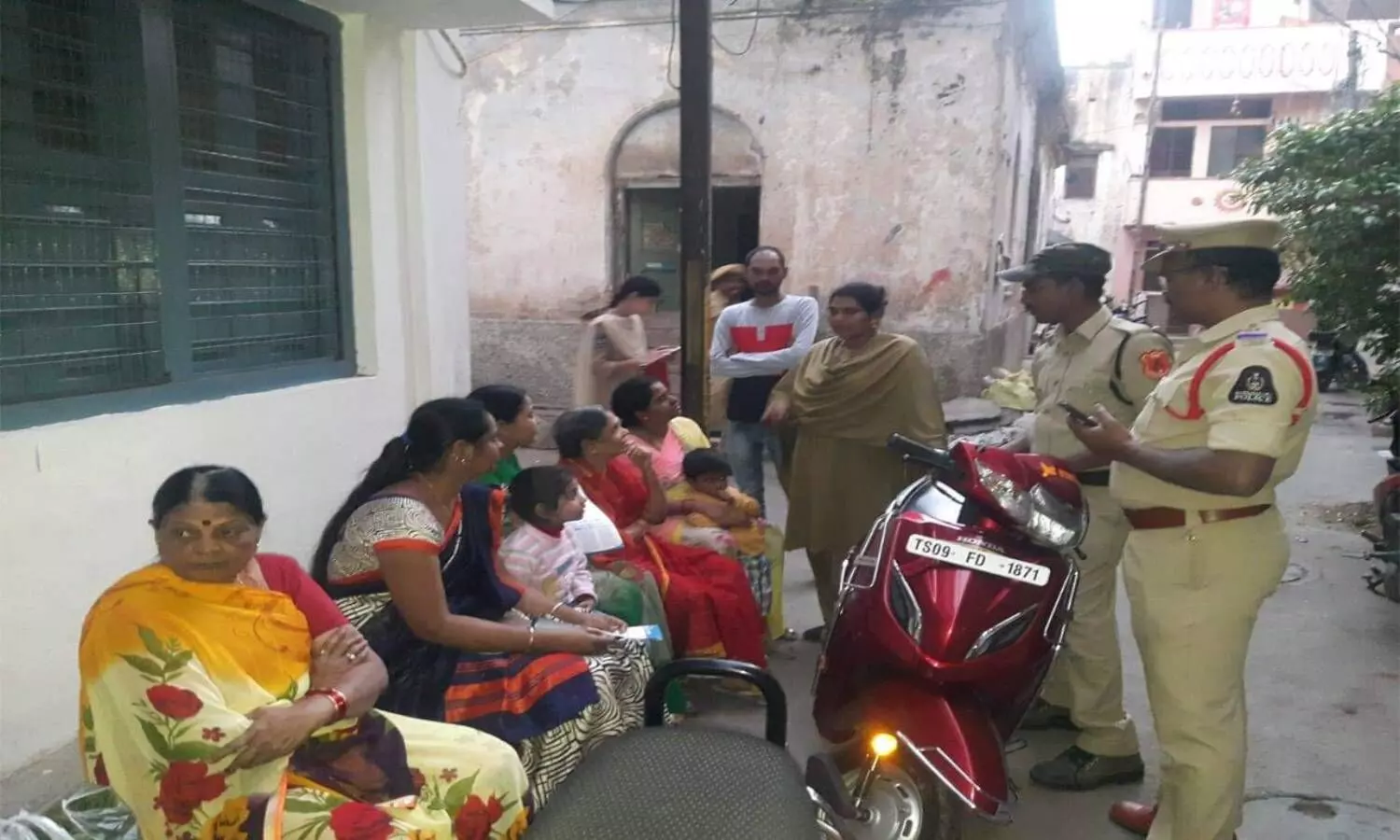Moosaram Bagh women threatened, intimidated by Hyd police's cordon & searches: Fact-finding report
The report published by the fact-finding team states that the women were caught unaware and were both confused and afraid when the police barged in without notice or prior information.
By Newsmeter Network
Hyderabad: In the three slums near the Musi river in the Moosarambagh area, women, after a long tiring day of work, were engaged in household chores. Most of the women here work as housemaids. At around 7:30 p.m on the night of 28 October, some 70 police officers, including women cops, from the Saidabad, Malakpet, and Amberpet police stations arrived suddenly and spread out all over the slum.
Without giving any information, some of the policemen barged into the houses and started searching every nook and corner. The women were terrified but remained silent. It was only after some time that a woman, Suguna, also a member of the domestic workers union, gained courage and asked the police what it was all about. But the policemen didn't respond. They ignored similar questions from other women and continued their search.
Later, a policeman responded but there was no clarity. The women got to hear different versions about the reason for the search - to find out if there are any stolen vehicles, illegal liquor, gutka, etc. The women didn't know what to say or do.
The search that continued for one-and-a-half-hour left the women so terrified that now they are constantly worried about who is going to come and when.
By the time the search was completed, the men had returned from work. The police called them separately to a nearby petrol bunk and asked them to inform them if they find anything suspicious.
On 7 November, a fact-finding team visited the Moosarambagh area where the cordon and search took place on 28 October. The team members included Jyothi Surya of Chaitanya Mahila Samakhya, activist and journalist Nikhat Fatima, journalist and writer Sajaya, Sujatha Surepally of the Dalit Women Collective, social activist S.Q Masood, civil rights activist Kaneez Fathima, and Bilal of the Human Rights Forum.
The report published by the fact-finding team states that the women were caught unaware and were both confused and afraid when the police barged in without notice or prior information.
Sharing the women's experience, Kaneez Fathima says, "It would be terrifying when all of a sudden so many police officers come." She explains that the police had collected the Aadhar cards of most of the women and also those of their young sons.
Sharing another concern that she heard from the women of Moosarambagh, Kaneez says, "Now the women are also worried if they will be seen in a bad light." She recalls one of the women saying 'we will be thought of as criminals'.
Kaneez also explains how these women are threatened by municipal officials or the electricity bill collectors. "When they pay their electricity bills, they are not given a receipt saying that they don't have records for the land they are living in," she adds.
Minorities targeted
Another important finding was that the cordon and search mainly targeted people from minority communities. In the slum areas near Musi river where the cordon and search were conducted, there are a total of 236 huts with a population of 1,500, approximately. The majority of people living there are Madigas, STs, two or three Muslim families, and five-six Mala families. They are from different districts of Telangana who came to Hyderabad in search of livelihood and are living here for 30-40 years. They work as domestic workers, daily wage workers, and drivers.
A cordon and search were also conducted in Teegal Kunta in the middle of Old City, a largely Muslim populated area. People here are small businessmen, auto drivers, and street vendors.
Legally invalid
The report points out the legal violations by the police during the search. The general law providing for the state's power of search and seizure of evidence is found in the Code of Criminal Procedure, 1973. The police misused Sections 93, 94, 97, 100, 102, and 103 of CrPc while conducting these searches.
The police have to get a warrant from the district magistrate (commissioner) before conducting the search in a particular place on strong evidence or grounds if any. These provisions of CrPC do not give any powers to district magistrates to conduct blanket searches without any strong reasons and grounds. The above sections of CrPC do not enable police to make such searches by ignoring the provision of Section 165 CrPC.
Section 165 is enacted to enable police to conduct a search when there is urgency and when it is not permissible to follow the lengthy process of securing a search warrant from the magistrate. It is further noted that on one hand, the provision enables police to search the house for investigation of any crime but on the other, it mandates the police to record reasons as the first step before entering the house.
Meanwhile, when the fact-finding team was presenting their findings at a Zoom press meet on 19 October, some unknown people hurled abuses at the team members, especially the women members.